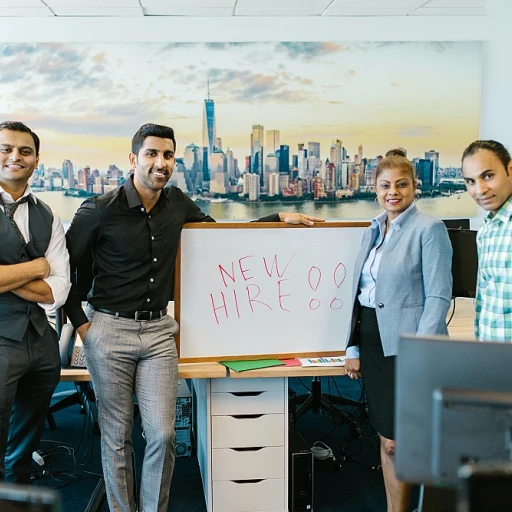
What is a Change Agent?
Defining the Role in Organizational Transformation
A change agent can be seen as a catalyst within an organization, someone who facilitates the processes of transformation and adaptation. Positioned at the forefront of change initiatives, these agents employ their skills to manage and guide company-wide shifts, ensuring a seamless transition and effective change management.
Whether internal or external, change agents play pivotal roles in driving forward business objectives and organizational goals. They possess a unique capacity to balance leadership with hands-on involvement in the change process, acting as bridges between management and team members while mitigating resistance to change.
These agents embody a proactive approach, anticipating challenges and crafting strategies that align with the cultural and structural dynamics of the organization. Understanding the role of a change management position helps companies appreciate the profound impact and necessity of these influencers.
Beyond their functional responsibilities, change agents are often tasked with embodying change themselves. This encompasses not only the reshaping of existing processes but also advocating for digital transformation and innovation in business practices. They inspire their teams by leading through example, often drawing from experiences and examples of successful change, to drive engagement and buy-in across all organizational levels.
In essence, the effective change agent is not just an implementer but a visionary, foreseeing potential obstacles and strategically planning for success. Their role is crucial in aligning the organization's strategic direction with its operational capabilities, ensuring that change is not just implemented but also sustainable over time.
Key Characteristics of Effective Change Agents
Essential Traits of Proficient Change Agents
To successfully navigate the complex landscape of organizational change, change agents must possess a unique combination of characteristics. These attributes are critical in enabling them to effectively fulfill their roles in driving HR innovation and organizational transformation.- Adaptability: Change agents must navigate rapidly shifting environments. Their ability to adjust and respond to unforeseen challenges determines their effectiveness in leading initiatives.
- Communication Skills: Clearly articulating the vision, purpose, and process of change is essential. Effective communication ensures that team members, management, and stakeholders align with the organizational goals.
- Leadership Abilities: Strong leadership skills inspire confidence in others, motivating teams to embrace change. Influential change agents lead by example, fostering a culture of innovation and collaboration.
- Problem-Solving Aptitude: Initiatives often encounter resistance or unexpected roadblocks. Proficient change agents harness their problem-solving skills to devise innovative solutions, steering the organization toward its objectives.
- Empathy and Emotional Intelligence: Understanding the concerns and emotions of people within the company is crucial. Empathetic agents build trust and reduce resistance by validating the experiences of those affected by change.
- Strategic Vision: Successful change agents possess a clear vision of the desired outcomes and align their strategies to support organizational goals. They effectively balance immediate needs with long-term aspirations.
The Role of Change Agents in Driving HR Innovation
The Influence of Change Agents on HR Innovation
Change agents carry a significant responsibility within an organization, particularly in the realm of human resources innovation. By acting as catalysts for transformation, these agents are integral in guiding companies through pivotal organizational change. But what exactly does this entail?
First, change agents bring a fresh perspective to traditional HR methodologies, intertwining modern strategies with established practices to foster digital transformation. They don’t merely react to changes passively; instead, they actively engage in change management processes, pushing forward innovative solutions to optimize HR operations.
Furthermore, change agents are pivotal in gathering and mobilizing the support of team members. They possess the skills to navigate the complexities of organizational culture and resistance, turning potential obstacles into opportunities for growth. Whether through internal influence or by engaging external expertise, they drive efforts that align with a company's organizational goals.
In aiming for sustained success, change agents focus on the holistic development of leadership and the nurturing of a change-friendly environment. This involves encouraging open communication and collaboratively working toward a shared vision with teams, ensuring a smooth transition during organizational shifts.
Their role doesn’t end at implementation; rather, they maintain a lasting impact through the streamlining of HR processes to achieve effective change. This continuous improvement mode helps the organization remain adaptable in the face of ongoing industry changes.
Ultimately, the role of change agents extends beyond mere facilitation—it's about embedding an enduring capacity for innovation within the company itself, ensuring both immediate and future readiness for organizational demands.
Challenges Faced by Change Agents in HR
Challenges Encountered by Change Agents in HR
The path to success for change agents in an organization is often fraught with obstacles that require skillful navigation. These challenges not only test the agent's resilience but also their capacity for innovation and adaptability in the face of transformation.One significant hurdle is the innate resistance to change exhibited by many individuals within an organization. This resistance is rooted in the fear of the unknown, changes in job roles, and the disruption of routine processes. To manage this, change agents must possess strong interpersonal skills and use effective change management strategies to alleviate concerns and foster a positive change environment.
Moreover, the dual role of managing both internal and external change pressures can be overwhelming. Agents need to balance internal change initiatives while staying attuned to external business trends and shifts in the marketplace to ensure alignment with organizational goals. The lack of clear communication can also hinder progress when team members are not on the same page about the objectives and benefits of a change initiative.
- Leadership buy-in: The absence of support from leadership can impede change initiatives. Ensuring leaders are engaged and champions of the process is crucial for credibility and the allocation of necessary resources.
- Cultural barriers: Organizational culture that values static processes over innovation poses a challenge. Change agents must advocate for a cultural shift that embraces agility and transformation.
- Lack of a clear strategy: Without a well-defined plan, efforts may become fragmented and lose direction, making it difficult for the entire team to follow.
Understanding these challenges is key for any effective change agent tasked with the responsibility of leading digital transformation and organizational change. Their strategic efforts play a crucial role in fostering a culture where innovation is not only encouraged but also celebrated within the company.
Strategies for Empowering Change Agents
Empowering Change Agents for Success
Empowering effective change agents within any organization requires strategic action. Change agents play a crucial role in driving organizational change, yet they often face challenges that require support from leadership and management. Here are strategic ways to empower these pivotal figures:- Develop Leadership Skills: Equip change agents with leadership training to help them lead teams effectively. Strong leadership helps navigate resistance and drive transformation within the company, facilitating smoother change management.
- Foster a Supportive Culture: Encourage a culture that values innovation and change. When team members and leadership embrace new ideas, change agents can implement new initiatives more seamlessly without fear of backlash.
- Provide Resources and Tools: Equip change agents with necessary tools and resources that support their role. Access to digital transformation tools can help in managing complex organizational change processes effectively.
- Build a Collaborative Environment: Encourage collaboration between internal and external agents. A collective effort can aid in overcoming barriers and facilitate effective change.
- Clear Communication: Establish clear lines of communication within the organization. By doing so, change agents can convey their vision effectively and gain necessary buy-in from stakeholders.
- Recognize and Reward Success: Acknowledge and reward successful change initiatives led by change agents. Recognition incentivizes and demonstrates the value of change efforts within the organizational structure.
Case Studies: Successful Change Agents in Action
Real-World Impact: Case Studies of Change Agents in Action
In the realm of HR innovation, change agents play a pivotal role in steering organizations through transformation. Examining real-world examples can provide valuable insights into how effective change management can be achieved.- Embracing Digital Transformation
- Navigating Cultural Shifts
- Fostering Innovation through Change Management












